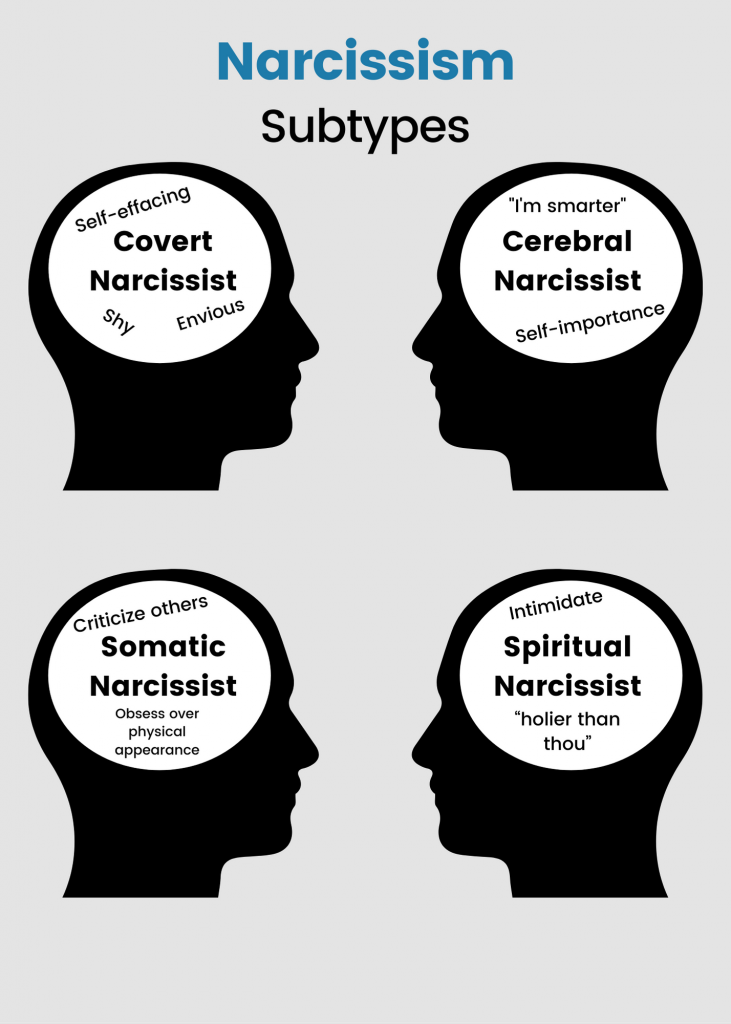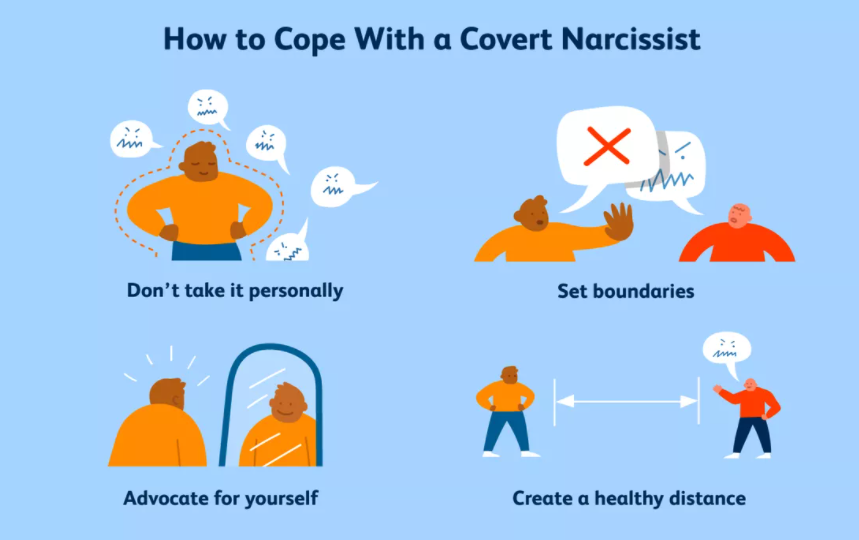
Narcissism is the term used to describe a lack of empathy, self-centeredness, and an exaggerated sense of self-importance. The everyday narcissist can be found lurking in our neighborhoods, offices, family gatherings, and in dating apps. While it’s hard to spot a narcissist because of their charisma, we can avoid getting into relationships with them by knowing the common red flags and having an exit strategy that allows us to get out while we can. (Estimated reading time: 8 minutes)
“When someone shows you who they are, believe them the first time.”
— Maya Angelou
It takes all sorts to make a world. As we go about our lives, we meet people with diverse backgrounds and personality types. Out of all those we meet, we get close to only a few.
On taking a closer look at those connections, we’ll notice one common factor: trust. Trust is a feeling of safety that allows us to open up and be vulnerable with the other person. We develop an understanding that we won’t be trampled on and disrespected by them.
Most people can hold a safe space for us, but some aren’t able to do that no matter how much we want them to. They seem to be missing the sensitivity chip that helps them tune into the feelings of others and maintain a harmonious flow in their relationships.
Narcissism is the common term used to describe this type of behavior, and narcissist personality disorder (NPD) is clinical. In addition to lacking empathy, narcissism is characterized by a self-centered and exaggerated sense of self-importance.
It doesn’t take a genius to guess that nurturing a close relationship with a narcissist is nothing short of a herculean task. If you’ve ever had the misfortune of dating or being in a relationship with one, you’re most likely familiar with the psychic drain of being in their presence.
The good news is that plenty of research and case studies document narcissism. We can avoid getting snared in its seductive trap by knowing how to spot a narcissist by looking for these common red flags and having an exit strategy that allows us to get out while we can.
Like a moth to a flame: understanding the allure of a narcissist

Not all narcissists become criminals and killers, although many of those who commit such atrocities exhibit malignant narcissism, a mixture of narcissism and antisocial personality disorder. The everyday narcissist can be found lurking in our neighborhoods, offices, our family gatherings, and in dating apps.
These are the types of narcissists who are the biggest threats to our well-being. They have the social dexterity to get what they want, even if it requires them to sabotage the success of others.
It’s hard to see through the facade and spot a narcissist because most people are so taken by their charisma. They can charm the socks off you and make you like or believe in them with your whole heart. Like a beautifully wrapped gift, they present themselves in the best light, not giving you an inkling of what lies beneath the shiny packaging.
The smoothest narcissists are adept at studying and observing their target and knowing exactly what to say to make them feel loved, valued, and wanted. That’s why the honeymoon phase with a narcissist is like no other – it’s an intoxicating experience where they shower you with validation, attention, and (empty) promises.
The most problematic type of narcissist is the Don Juan or Femme Fatale. These amorous individuals always have a hidden agenda – money or physical intimacy. Through the art of seduction, they lure their prey into becoming enamored with them so they’ll get what they want, after which they move onto the next conquest.
If someone does end up in a partnership with a narcissist, exploitation and manipulation are common in the relationship. At their core, these connections are transactional because a narcissist ultimately views people as objects who are a means to an end.
There’s an unspoken agreement of, “I stroke your back, you stroke mine,” which can work if the narcissist is consistent with meeting their end of the bargain. However, they seldom do. Someone who is looking for a meaningful connection based on genuine love will never be satisfied with the contractual affair that these individuals offer.
Moreover, narcissistic partners are often the most demanding, always asking for more attention, praise, and time. Inevitably, their partner realizes that no matter what they do for them, it’s never enough, and they end up losing every shred of self-worth in the connection.
If you’re someone who’s acquainted with a narcissist, you may be wondering if there is any hope for them. Are they always going to be exploitative and scheming in their dealings with others? Where they lie in the narcissism continuum will have a huge impact on their patterns of behavior, as will the underlying cause.
Evil or wounded: why narcissists act the way they do

If you’ve been burned by a narcissist, it’s natural to think that they’re under the grips of evil forces. After all, aren’t arrogant, selfish and entitled individuals who deceive others for their own gain the very definition of an evildoer?
In the past, when religion prevailed in society, narcissism was certainly classified as evil, especially if it motivated acts of harm and malice. However, it was also be seen as a benign form of pathological self-absorption that was first identified in the Greek myth about Narcissus, a hunter who fell in love with his own reflection in a pool of water.
Based on this caricature, the ancient Greeks coined the term “hubris” to describe the concept of exaggerated pride and selfishness. It wasn’t until the late 1800s that narcissism was conceptualized in psychological terms – first by Havelock Elis in 1898, followed by Freud in 1914. In 1968, The American Psychiatric Association listed narcissistic personality disorder in its Diagnostic and Statistical Manual of Mental Disorders (DSM).
While the actual cause of NPD is unknown, studies have shown that factors such as early life experiences of abuse, trauma, unreliable parenting, and a lack of authentic validation all contribute to the personality disorder. Genetics and biology have also been shown to play a key role.
If want to spot a narcissist, it’s important to note that not everyone with narcissist traits has a narcissist personality disorder. Narcissism exists on a continuum that ranges from subtle to dramatic and varies with context.

We all embody narcissistic qualities from time to time because we’re naturally wired to be self-focused to ensure our survival. Narcissists, however, take this inclination to the next level by consistently demonstrating their narcissistic traits with higher intensity.
A diagnosis of NPD can only be made by mental health professionals who will assess a subject by looking for specific impairments in personality functioning that are consistent over time and conditions, and that consequentially disrupt all facets of their life.
Narcissism can show up in people’s behavior in different ways. Research suggests that there are two distinct types:
1. Overt narcissism: characterized by boldness, grandiosity, and arrogance. Those with this type are more likely to be aggressive, lack empathy, and exploit others.
2. Covert narcissism: people with this form portray a vulnerability and a “poor me” attitude to gain approval from others. If they don’t get it, they withdraw and stonewall.
Because of how deeply entrenched these traits are, the prognosis for people with NPD is not promising. The biggest barrier is that narcissists are very resistant to change and rarely see any fault in their behavior. Those who do agree to seek treatment have to go through many years of therapy with a qualified therapist to build their self-esteem.
No matter how you slice it, dealing with a narcissistic personality is always going to be an uphill climb. To minimize the risk of getting hurt, we should take matters into our own hands and be watchful of who we allow into our space.
Protecting ourselves: identifying narcissists and their game

It’s not easy to spot a narcissist at first glance. They almost always appear confident and may even talk a big game, but beneath the façade, they are fragile and susceptible to anxiety, depression, and substance abuse.
If you suspect that you’ve met a narcissist, stick around and watch them over a period of time before jumping ship. Even the best actors won’t be able to keep their masks on for very long.
In a romantic connection, it’s essential to keep your feelings in check while you do this. Remember that narcissists are known to be some of the best seducers out there and can sweep you off your feet if you’re not aware of what’s going on.
Spot a narcissist by watching out for these classic red flags when interacting with a suspected one:
- Arrogance
- Lack of empathy and the ability to identify the needs of others
- The need for constant admiration and praise
- A sense of entitlement and an expectation of special treatment
- Exploiting others for personal gain
- Envying others and believing that others envy them too
- Exaggerating talents and achievements to appear superior
- Obsession with power and success
- A sense of grandiosity that makes them believe that they are special, unique, and gifted
- Opportunistic and taking advantage of others to get what they want
If you see any of these behaviors consistently repeated, and your gut tells you that something is off about the person, the best thing to do is cut your losses and leave.
Don’t fall for the fantasy that you can change a narcissist or that they will get better with time. In my dealings with narcissists (I’ve had a few), that hardly ever happens. It’s a losing battle and your self-worth shatters the more time you spend with them.
You’ll also feel alone and emotionally unfulfilled because you’re with someone who does not have the emotional bandwidth to give you what you want.
If you were able to spot a narcissist in your life, and you want to stick it out, or you need to stay in a relationship with a narcissist temporarily while planning your escape, here are some ways to cope:
1. Create boundaries: Narcissists have little regard for personal space and feel that they have the right to invade your possessions and your mind. That’s why it’s important to set clear boundaries and take action if they are not honored.
2. Speak up for yourself: If you feel like you’re being attacked, defend yourself calmly and gently, telling them what’s acceptable and how you expect to be treated. Avoid looking flustered or annoyed as this may motivate them to continue. It’s possible that they will push back when you make your requests, in which case, you’ll have to stay firm and strong.
3. Create a support system: When you’re with a narcissist, you need to find people with whom you can replenish your emotional reserves. Consider confiding in a friend, a counselor, or joining a support group who can give you perspective and remind you of your worth.

4. Don’t take things personally: Because narcissists lack empathy, they can be callous and irresponsible in their communication, with little regard for how their words impact others. They’re also prone to angry outbursts and passive-aggressive behavior. When they’re triggered, remember that it’s not about you and their criticisms are not a reflection of your potential.
5. Have a life of your own: Should you decide to stay with a narcissist, it’s essential to carve out a life of your own. Remove the focus from them by developing your own interests, hobbies, and friendships to instill a sense of identity and purpose.
6. Manage your expectations: The best way to avoid disappointment is to manage your expectations of what your narcissistic partner can give you in your connection. Remind yourself that they don’t have the traits that are conducive to a heartfelt relationship based on respect, integrity, and authenticity.
Love never hurts. The real kind makes you feel valued, cherished, and understood. In this container of safety, both people can relax and be their true selves. Believe that you’re worthy of this and that you deserve nothing less. When you do, you’ll invite the abundance of love that’s waiting at your doorstep.
All my best on your journey,
Seline

Question for you: What has your experience been like with a narcissist? What red flags helped you spot a narcissist and how did you deal with them?
Did you like this post? Sign up below, and I’ll send you more awesome posts like this every week.

Excellent post Seline: I can tell you have some personal experience with these types. So do I. In fact, I was having a situation at the time I met you. These people can downright destroy your life. Great post.
Thank you, George! Oh yes, I’ve met a few unfortunately. I remember you telling me about your situation. It’s a good thing we were both able to dodge the bullet. 🙂 Hope you’re well!
Anyone who has met a narcist person will never forget it- if they can survive the experience. It just surprises me all the time how many people are surprised to learn so and so was like this and had these traits, they usually are not hard to spot if you get past their thin outward apperance and get past their song and dance! I think more people need to be aware of these warning signs for sure!
I think the way the really bad ones manage to stay hidden for so long is that they tend to surround themselves with fellow narcissists. They feed off each other and when you just compare one to another, they all start to look less severe and extreme. At least that is my thought.